Can a Marketing Attribution Software Increase Your Bottom Line?
Last Updated on December 25, 2024
Marketing attribution software have been gaining traction the past couple of years. Seems like more and more businesses understand the essential part they play in identifying which marketing efforts are driving conversions, sales, and customer engagement. These software help businesses track and analyze the customer journey across various touchpoints, allowing them to make accurate data-driven decisions about their marketing strategies and budget allocation.
Real Life Example
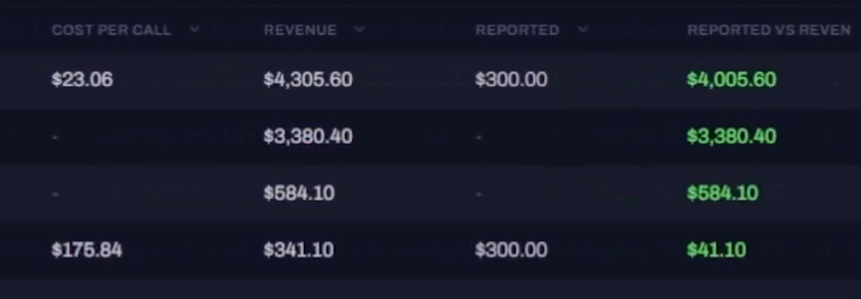
One of the biggest problems for businesses running ads is that ad platforms don’t track repeat sales, subscription charges or predict accurate long term revenue. This than leads to wrong optimization of your ad targeting because the pixel is trained on incomplete data. That’s where marketing attribution software comes in. Here’s a simple example to help you understand: Say a pet store owner spend $300 on Google ads which brings him 1 new customer that spends $100 initially. but 1month later that customer comes back and spends another $100, and the month after that another $100 and he ends up spending $1000 throughout the course of the year. On the surface your Google Ads reporting is showing a loss of $200 for this customer when in fact you revenue is $700 after a year.
If you have the real value of the customer you can spend more on marketing and make more . That’s the power of marketing attribution software.
(3) main types of marketing attribution Models
- Single-touch attribution models:
- First-touch attribution: Gives 100% credit to the first touchpoint in the customer journey.
- Last-touch attribution: Gives 100% credit to the last touchpoint before conversion.
2. Multi-touch attribution models:
- Linear attribution: Distributes credit equally across all touchpoints.
- Time decay attribution: Gives more credit to touchpoints closer to conversion.
- U-shaped attribution: Gives 40% credit each to first and last touch, 20% split among middle touchpoints.
- W-shaped attribution: Gives 30% credit each to first touch, lead creation, and opportunity creation, 10% split among other touchpoints.
- Custom attribution: Allows customized credit distribution based on business needs.
3. Marketing mix modeling (MMM):
- Uses statistical analysis to determine the impact of various marketing tactics on sales and other business outcomes.
- Considers both online and offline channels.
- Attempts to measure less trackable channels like TV, radio, and print.
Key differences:
- Single-touch models are simpler but provide limited insights.
- Multi-touch models offer a more comprehensive view of the customer journey.
- MMM takes a broader approach, considering overall marketing impact rather than individual customer journeys.
Best marketing attribution software available in 2024
Hyros – Best Overall
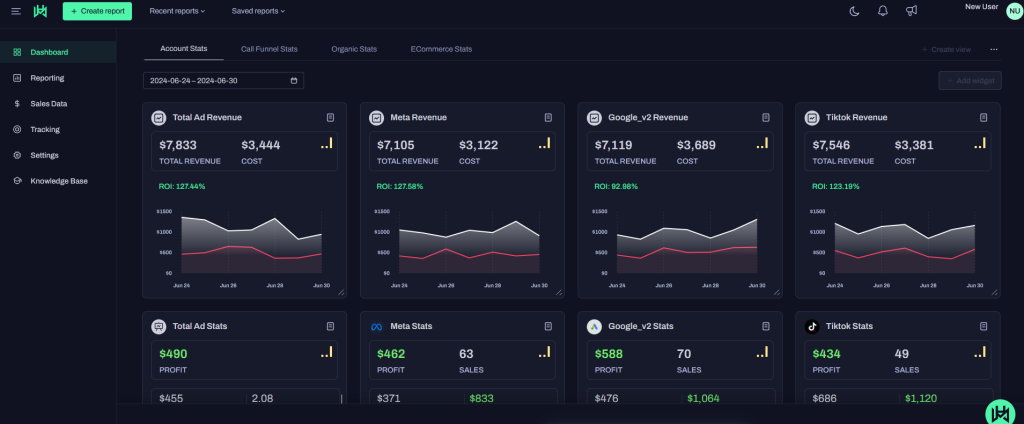
Hyros offers accurate tracking of calls, sales, and leads, surpassing the reliability of Facebook and Google Ads’ native tracking. The dashboard provides detailed revenue, sales, and lead metrics, customizable with various widgets for comprehensive data analysis.
Reporting in Hyros allows for detailed campaign analysis, integrating UTM tags to track conversions from different marketing channels like email campaigns.
Sales data section enables deep dives into individual sales, showing the buyer’s journey and click path for each purchase. Hyros integrates with Facebook and Google Ads, providing overlaid data within their platforms for enhanced decision-making.
Among Hyros clients you can find big corporations and brands like Tonyrobbins.com Imact Theory GymLaunch and clickfunnels.
Key Features:
- Advanced Tracking and Attribution: Get detailed tracking of customer journeys across various platforms and devices, ensuring that every touchpoint is accounted for in the attribution model.
- Ad Spend Optimization: The platform offers insights and analytics that help businesses optimize their ad spend by identifying the most effective channels and campaigns.
- Revenue Tracking: Track revenue generated from different marketing activities, providing a clear picture of which efforts are driving the most sales.
- Customizable Attribution Models: Users can customize attribution models to fit their business needs, whether it’s first-click, last-click, or multi-touch attribution.
- 90 days money back Guarantee.
Pricing
Pricing varies based on tracked revenue, starting from $3,500 monthly for up to $40k tracked revenue. Higher tiers available for larger volumes.
SegMetrics– Best Affordability
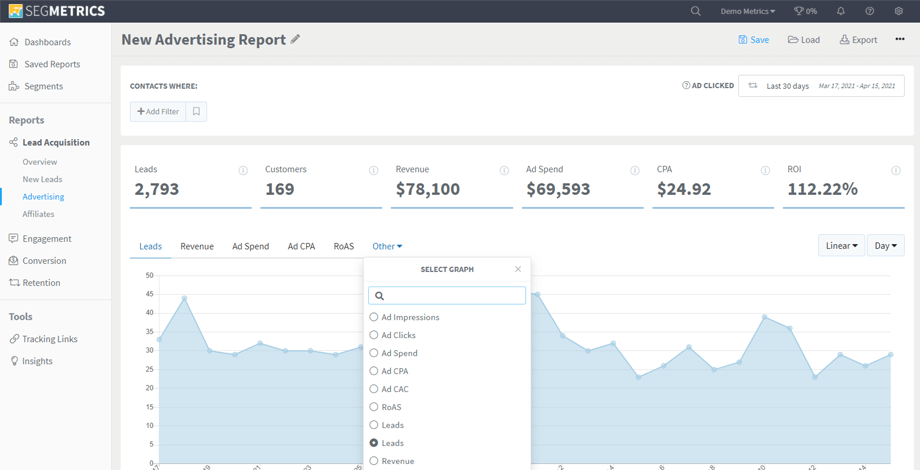
SegMetrics integrates data from various platforms into a unified data lake, including demographics, e-commerce, website analytics, and sales calls. The web attribution feature in SegMetrics allows detailed tracking of campaign performance across different channels and is shown in customizable dashboards for quick insights and decision-making.
Key Features:
- Detailed Customer Journey Tracking: Track the entire customer journey, from the first interaction to conversion, providing comprehensive visibility into how customers engage with your brand.
- Funnel Analysis: SegMetrics allows you to analyze your sales funnels to see where prospects drop off and which stages are most effective in converting leads to customers.
- Automated Attribution Models: The platform uses automated attribution models to assign credit to different touchpoints in the customer journey, making it easier to understand the impact of each interaction.
- Real-Time Data.
- 14 days free trial.
Pricing
Monthly pricing start at $175 for essentials plan, $375 for intelligence plan and $675 for business plan. Annual pricing will get you 2 months free.
Adbeacon– Best for Media Buyers
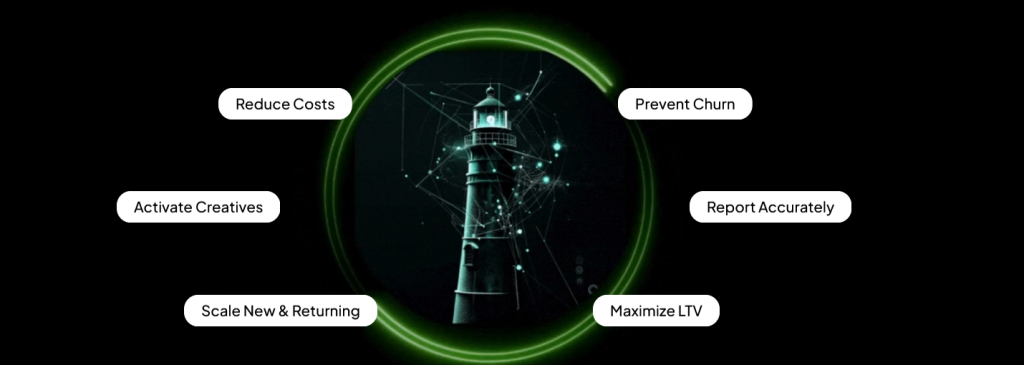
AdBeacon offers real-time, accurate attribution data by leveraging first-party data tracking across multiple channels, including e-commerce platforms and popular advertising networks like Facebook, Google, and TikTok. It touches all the “pain points” of media buyers who are very sensitive on each advertising dollar spent.
Key Features:
- First-party data tracking: The platform uses 1st party data for accurate attribution, starting with tangible purchases and eliminating 3rd party guesswork.
- Multiple attribution models: Users can analyze channel attribution by first click, last click, linear, and full impact. AdBeacon also offers a custom “Lighthouse” attribution model for optimization.
- In-platform optimization: Decisions can be made within AdBeacon, including scaling budgets and managing campaigns.
- New vs. returning customer data: Provides the ability to filter data by new and returning customers across campaigns, channels, and ads.
- Creative performance analysis: Includes a creative dashboard to analyze which creatives are making an impact.
Pricing
Starts at $299/month. The more advanced plan for agencies has custom pricing and more advanced features such as multi account, early access to beta features and training seminars.
Ruler Analytics
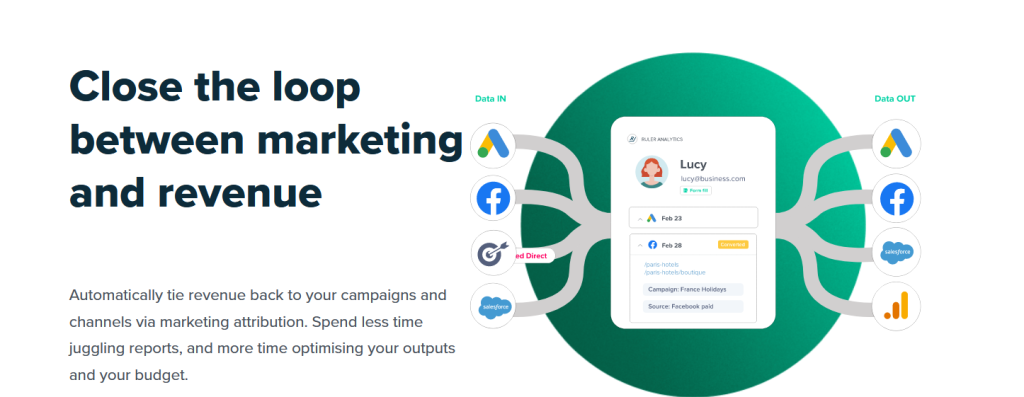
Ruler Analytics offers comprehensive marketing measurement and attribution solutions, including multi-touch attribution and marketing mix modeling.
It enables businesses to automatically connect revenue with specific marketing campaigns through effective marketing attribution. The platform integrates with Google Ads Facebook Ads, Google Analytics, Sales Force. And various marketing applications to consolidate data for optimal decision-making.
Integration capabilities extend to over 1,000 apps, enhancing the functionality of existing tools for better revenue tracking.
Additional tracking features include call tracking, form tracking, and live chat
Key Features
- Marketing Attribution: Link closed sales back to your marketing efforts, providing insight into which channels and campaigns are driving revenue.
- Call Tracking: Call tracking functionality to monitor phone conversions.
- Multi-Touch Attribution: The tool offers multiple attribution model types, allowing you to switch between different models to analyze marketing performance.
- Sales Opportunity Attribution: Analyze the effectiveness of campaigns at every stage of your sales pipeline and identify lucrative sales opportunities.
- Customizable Dashboard: The platform offers a dashboard where you can view key reports on marketing performance, including channel, source, keyword, and landing page reports.
- Offline Campaign Tracking: You can upload costs for offline campaigns such as conferences, events, and print advertising.
Pricing
£199/month (UK based company so the price is in pound) based on 5,000 monthly visits, £584 based on 50,000 monthly visits, and £999 based on 100,000 monthly visits. Annual discount is 10%.
Triple Whale -Best For eCommerce
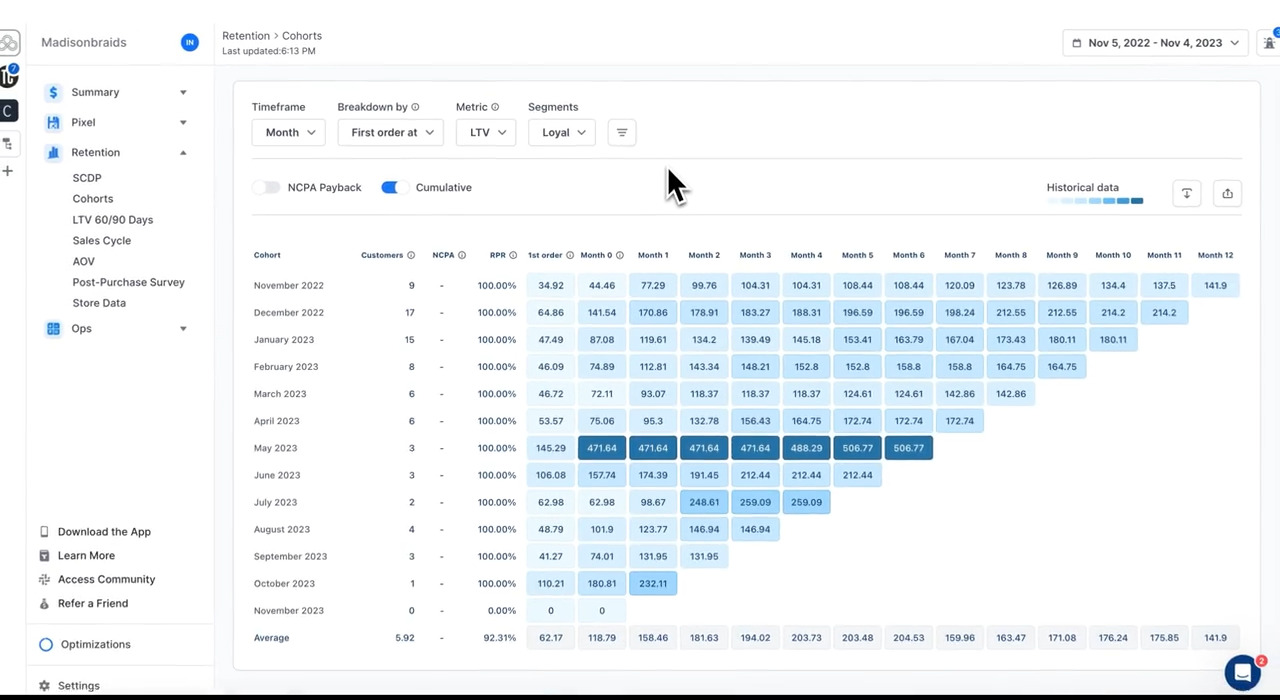
Triple Whale offers an intuitive and native-like interface similar to Facebook Ads Manager, facilitating easier navigation for ad performance review. It is very popular among eCommerce business using Shopify (Triple Whale currently integrates only with Shopify) . The Total Impact Attribution feature uses AI to blend first and zero-party data, providing insights into platform contributions to overall store revenue. Total Impact Attribution evenly distributes credit for purchases across all contributing platforms, offering clearer insights into where to allocate ad budgets for optimal growth.
Key Features:
- Centralized Dashboard: Triple Whale offers a centralized dashboard that consolidates all your marketing data in one place, providing a comprehensive overview of your performance metrics.
- Real-Time Analytics: Triple Whale provides real-time analytics, ensuring that you have up-to-date insights to make timely decisions and optimize your campaigns.
- Ad Spend Optimization: Triple Whale provides insights and recommendations for optimizing your ad spend, ensuring that you get the best return on investment from your marketing budget.
- Customer Segmentation:Triple Whale allows you to segment your customers based on various criteria, helping you target specific groups with tailored marketing campaigns.
- Free Option- Founder Dash is free forever with limited options.
Pricing
Starting at $129 for business with under $100K GMV and changes according to your gross merchandise volume. Annual pricing will get you 2 months free.
Wickedreports
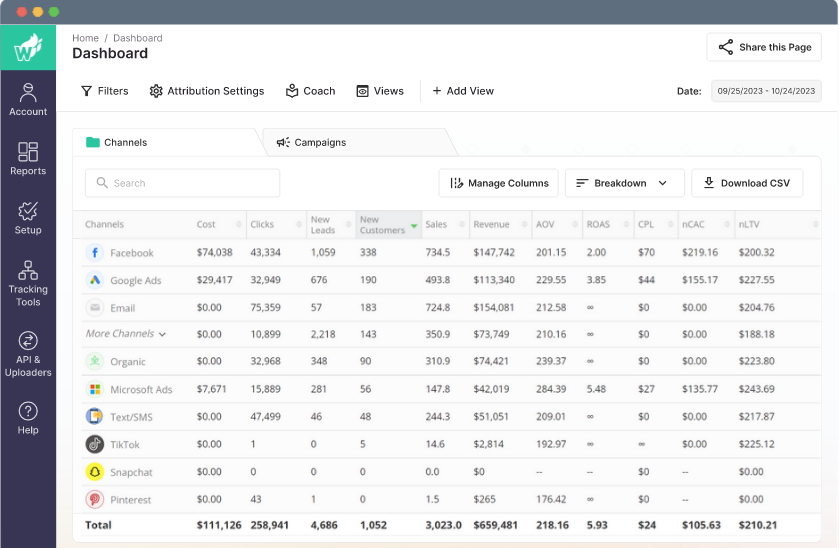
Wicked Reports offers comprehensive marketing ROI analytics, tracking every click and attributing them to actual sales data. Using Wicked Reports, you can optimize marketing budget and increase return on investment by capturing missed opportunities.
Key Features
- Multi-channel attribution: Tracks customer journeys across multiple channels like email, social media, and paid ads.
- Lifetime value tracking: Attributes customer lifetime value back to top-of-funnel lead conversions.
- Subscription revenue tracking: Automatically detects and attributes recurring subscription revenue to the appropriate marketing channels.
- Extended attribution window: Offers an “Attribution Time Machine” with infinite lookback and look-forward windows, overcoming limitations of platforms like Facebook’s short attribution window.
- Wicked Coach: An automated analysis tool that saves time by identifying growth opportunities and detecting areas of ad spend waste.
- Funnel Vision: Enables easy comparison between Wicked Reports’ attributed results and those reported by platforms like Facebook..
Pricing
Starts at $500/month for the basic plan (Wicked Good) and $800/month for the pro plan (Wicked Awesome). For a more advanced plan you need to contact sales. Annual pricing will get you 17% discount.
When choosing attribution software, consider these Factors
- Your business size and industry
- Specific attribution needs
- Integration capabilities with existing tech stack
- Budget
- Reporting and analytics features
Take advantage of free trials and demos offered by marketing attribution software companies to help determine the best fit for your business/organization.
Let’s recap why Marketing attribution software is so important this day and age
- Accurate measurement of marketing effectiveness: It allows businesses to precisely track which marketing channels, campaigns, and touchpoints are driving conversions and sales. This helps marketers understand the true impact of their efforts across different platforms.
- Optimizing budget allocation: By identifying the most effective marketing channels, companies can allocate their budgets more efficiently, investing more in high-performing areas and reducing spend on underperforming ones.
- Improving ROI: With better insights into which marketing activities are generating revenue, businesses can maximize their return on investment and prove the value of their marketing efforts.
- Understanding the customer journey: Attribution software provides a comprehensive view of the customer’s path to purchase, revealing how different touchpoints interact and influence buying decisions.
- Data-driven decision making: It enables marketers to make informed, data-backed decisions about strategy, messaging, and channel selection rather than relying on guesswork.
- Personalization: By tracking individual customer interactions, marketers can create more personalized and targeted campaigns.
- Cross-channel insights: Many attribution tools offer multi-touch attribution, helping marketers understand how different channels work together in the customer journey.
- Adapting to changing privacy landscape: As third-party cookies phase out, first-party data from attribution software becomes increasingly valuable for understanding customer behavior.
- Real-time optimization: Some advanced attribution tools provide real-time insights, allowing marketers to quickly adjust campaigns for better performance.
In today’s competitive digital landscape with ad costs constantly on the rise, marketing attribution software is vital for businesses to survive and prosper. Make data-driven decisions, and ultimately drive better results and ROI for your business.




